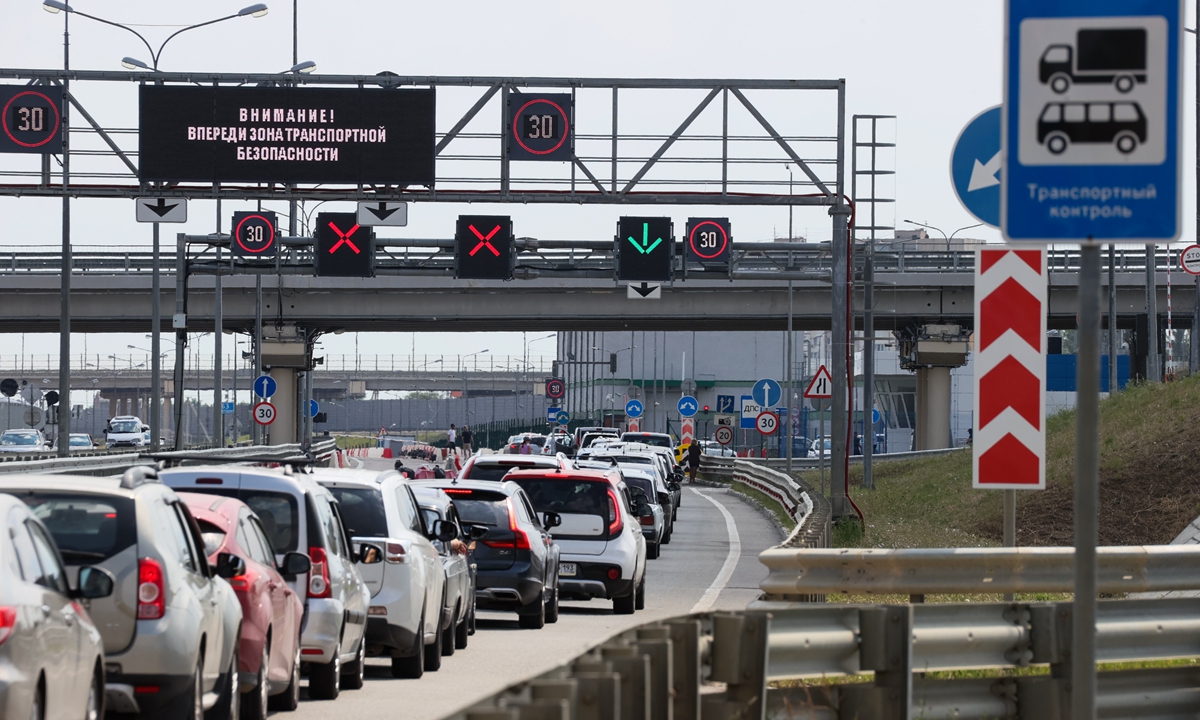
Cars move on Crimean Bridge on July 18, 2023 as traffic has partly been resumed after drone attacks the previous day. Russia accused Ukraine of carrying out the attacks with the involvement of the US and the UK. Photo: VCG
With a Ukrainian drone hitting a Crimean ammunition depot prompting authorities to close the Crimea bridge again and overnight Russian strikes on Odessa that destroyed buildings including the Transfiguration Cathedral over the weekend, the Chinese Embassy in the Ukraine issued a security notice on Sunday morning reminding Chinese nationals to take strict security precautions given the frequent air strikes in the south of Ukraine.
Some experts said while the Russia-Ukraine war is still in a stage of stalemate, some factors including frequent attacks on critical military facilities and ports, the use of cluster munitions and the suspended Black Sea grain deal have brought uncertainties to the situation which could witness another escalation.
A drone attack on an ammunition depot in Crimea prompted authorities to evacuate everyone within a five-kilometer radius and briefly suspend road traffic on the bridge linking the peninsula to Russia, the Guardian reported on Saturday, citing regional governor Sergei Aksyonov.
The Ukrainian military took credit for the attack, Deutsche Welle reported.
The drone attack followed a recent attack on the Kerch Bridge connecting Crimea to mainland Russia - the second time the bridge has been hit in 10 months. The attack on the Crimean bridge, a vital symbol of Russia's claimed sovereignty, also caused a strong reaction from Kremlin as Russian President Vladimir Putin vowed to retaliate.
Meanwhile, Russia launched high-precision Onyx missiles and sea-to-shore Kalibr cruise missiles on Odessa after midnight on Sunday, the Guardian said, citing Ukraine's Air Force. Odessa governor Oleh Kiper said besides killing one and injuring 19 people including four children, it also damaged residential and religious infrastructure.
Russia's RIA Novosti news agency says its war correspondent Rostislav Zhuravlev was killed by Ukrainian shelling as he covered the fighting in Zaporozhye Region. Several other journalists were wounded in the strike, RT reported.
"There are several factors that could lead the Russia-Ukraine crisis to further escalate, including the use of cluster munitions, and Russia's attacks on Ukraine's important military facilities and ports. On the cluster munitions, Russia may react forcefully," Song Zhongping, a Chinese military expert and TV commentator, told the Global Times on Sunday.
Moscow accused Kiev of using cluster munitions supplied by the US in the attack that killed one Russian journalist and wounded several others, and the Russian Foreign Ministry said "the responsibility for the killing also lies with those who supplied Ukraine with cluster munitions," the Al Jazeera reported on Saturday.
"As major battlefields in the Ukraine-Russia war are in a stalemate, we may see more attacks by drones or unmanned surface vehicles, creating more damage and pressure on each side. And now the impact of the war has extended from military to politics and the economy," Zhang Hong, an associate research fellow at the Institute of Russian, Eastern European and Central Asian Studies of the Chinese Academy of Social Sciences, told the Global Times on Sunday.
The recently halted Black Sea grain deal is part of diplomatic and economic warfare as Russia hopes to break down the Western sanctions against it, although it will make Ukraine's economy even worse this year, Zhang said. "Also, both Russia and Ukraine said that all merchant ships entering and leaving local ports are considered to be carrying military supplies, which could be intercepted or even attacked, indicating that the security situation in the Black Sea region is drastically deteriorating."
China hopes that the relevant parties will act in the interests of maintaining international food security and alleviating the food crisis in developing countries, in particular by working with UN agencies to strengthen dialogue and consultations and meet each other halfway, to strive for a balanced solution to the legitimate concerns of all parties and resume the exports of grain and fertilizers from Russia and Ukraine at an early date, Geng Shuang, China's deputy permanent representative to the UN, told at the UN Security Council meeting on Friday.
"Although Russia has brought up some conditions for resuming the deal, including lifting sanctions on grain and fertilizer, Western countries are unlikely to meet those conditions, which could make the situation further escalate," Song said.
The biggest problem now is that there is no sign of peace talks in sight, neither between Russia and Ukraine nor between the US and Russia, putting a deadlock on the war, Song said.
The collapse of the Black Sea deal is Russia's retaliation for Ukraine's attack on Russian civilian facilities, and aims to force Ukraine to stop attacking facilities like Crimea bridge, and only when the relevant parties of the deal ensure and supervise that Ukraine does not attack Russian civilian facilities, will the deal resume, Cui Heng, a lecturer at the China-Shanghai Cooperation Organization training base for international judicial exchanges and cooperation, told the Global Times on Sunday.
"Russia's retaliation against Ukraine was strong, especially the blockade of the port of Odessa, which shows that Russia still has a strong will to fight this war," Cui said.




